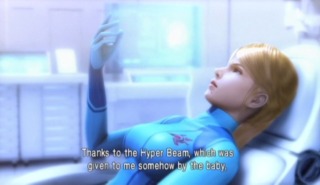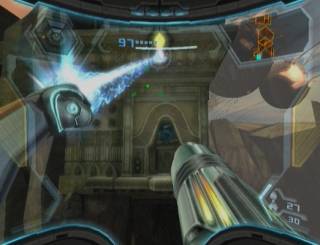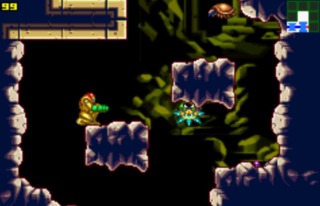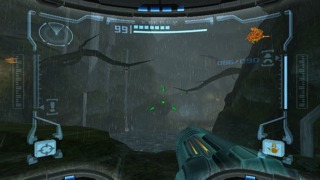Metroid and Me, Bonus: Series Ranking
By majormitch 22 Comments
Welcome to the final, final part of “Metroid and Me!” The actual blog series wrapped up last week with part seven, but I figured why not have a little fun and write one more “bonus” entry? This part only tangentially relates to what came before it; it’s certainly about Metroid and how it relates to my personal tastes, but we’re done diving deep into all the details about why Metroid connects so strongly with me. This time, we’re going to loosen up a bit and do an old-fashioned ranking of the Metroid games. Not all Metroid games are created equal after all, and this gives me a chance to explain which games I feel best encapsulate all of the traits I’ve been talking about over the past seven weeks. On the flip side, I can also clarify which Metroid games perhaps don’t execute on all these ideas as much as I‘d like. We’ve talked a lot about Metroid’s design in the scope of the entire series, and this is me evaluating how it all pans out in the individual games. Otherwise, I intend for this part to be a little more lighthearted, and hopefully it’s an entertaining read. Thanks again for reading, and away we go!
| Remix Title: Brinstar | Original Song: Brinstar (Metroid, 1986, NES) |
| Remixer(s): Metroid Metal | Original Composer(s): Hirokazu Tanaka |
Series Ranking
Note: The only Metroid game absent from this list is Metroid Prime Pinball, as it is the only one I haven’t played. Plus, it’s a pinball game, so it doesn’t really fit anyway.
10. Metroid: Other M

The game at the bottom of this list should come as no surprise. In a number of ways, Metroid: Other M is a Metroid game in name only, as it eschews many of the series’ defining traits. While I’m by no means opposed to trying something different, Other M simply doesn’t pull it off. First, the world is not fun to explore at all. The game’s heavier focus on combat funnels you through more sterile and linear environments, with rote collectibles barely off the main path. Second, I did not find the combat fun, and the controls could be frustrating at times. Playing with a sideways Wii remote means eight-way movement in a 3D space, which is clunky already. But even worse is pointing the remote at the screen to switch from third to first person when you need to shoot missiles, which is a jarring, unintuitive mess. Finally, the game’s tone is… pretty awful. Even past a lack of worthwhile atmosphere, the constant anime-style exposition dumps are full of atrocious writing and acting, pulling the player out of the experience for no good reason. This game has way more characters and dialogue than any other Metroid game (maybe more than all of them combined), and is the biggest example why Metroid is better off without that stuff. From top to bottom, Other M is easily my least favorite game in the series. In fact, it contains so little of what I love about the series that part of me doesn’t even want to call it a Metroid game. The best I can do though is put it at the bottom of this list, where it belongs.
9. Metroid Prime Hunters
Honestly, I don’t remember much about Metroid Prime Hunters. While I remember it being a somewhat impressive technical achievement, by virtue of adapting mostly functional first person shooting onto a handheld in 2006, the fact that the underlying game is such an unmemorable entry to this franchise is why it sits so low on this list. Nothing about the campaign, from the world to the items to the bosses, stands out in my mind as anything noteworthy. My general recollection is it being a pretty bland experience meant to showcase the aforementioned shooting more than anything. I think the multiplayer might have been alright? Regardless, while I don’t remember it as a bad game by any stretch, it certainly doesn’t stand out enough to endear itself to me. Especially not when compared to other Metroid games.
8. Metroid II: Return of Samus
From here on I like all of the remaining Metroid games, if to varying degrees. Each one contains at least some of the positive traits I’ve discussed about the series, and as we go we’ll see that the ones near the top of the list simply execute more of them better. For Metroid II: Return of Samus’ part, the main thing I like about it is the sheer scope of the world. There’s a lot to dive in and explore here, and for the most part it’s a good Metroid adventure. Story and lore-wise, it also tells one of the most pivotal chapters of the entire series. Where it falters for me is primarily in the atmosphere department. The world looks pretty similar throughout, defined by bland looking caverns, and the enemies and music don’t have the punch or variety that I really want either. It also doesn’t help that some of the exploration here is among the most thoughtless and tedious in the series. You have to bomb seemingly random, nondescript walls to find a number of items, and the fact that the spider-ball allows you to crawl every single inch of this world makes that a herculean task. But as long as you aren’t obsessed with getting 100%, Metroid II remains a perfectly fine Metroid game.
7. Metroid Prime 3: Corruption

Of all the Metroid games, Metroid Prime 3: Corruption feels like Nintendo’s biggest push to broaden the series’ appeal to a larger market. Aside from Hunters, this is the most shooting-focused Metroid game. And aside from Other M, it’s the one with the most action set pieces. It also simultaneously has more dialogue and exposition, and tamer puzzles and exploration than most. In other words, it’s meant to be a breezier, more direct experience by comparison. The two primary casualties of this are the world design and the sense of isolation: travelling between multiple disjoint worlds doesn’t have the same scale or sense of discovery as a single large ones does, and the poor dialogue and stilted NPCs break any immersion the atmosphere tries to create. But past that, there’s still some good stuff in here. The game looks and sounds amazing, the shooting does feel pretty good, and the individual areas manage to capture that quintessential Metroid feel in bursts. I simply wish it did so more consistently, and dropped some of the unnecessary distractions (bad dialogue, traveling between worlds, etc.). Targeting a broader audience means Corruption doesn’t hit a “fan” like myself quite as hard, but it’s a very good game nonetheless.
6. Metroid Fusion
In some ways, Metroid Fusion occupies a similar place in my brain as Corruption. First, it presents its world as multiple disjoint levels, and as I stated above, bouncing between them doesn’t hold the same appeal as a single interconnected world. That said, Fusion’s world is a little more connected than Corruption’s; its different sectors exist on the same space station, and do occasionally connect to each other. That’s the chief reason I place Fusion above Corruption, but I still ultimately prefer a more fluid world. Second, Fusion has more dialogue and exposition than a lot of Metroid games, roughly on par with Corruption. Existing solely as a conversation between Samus and a computer, it’s not as intrusive as it could be. But I still don’t think it’s good writing, and I’d prefer to just leave it out and avoid the distraction altogether. Those relatively minor gripes asides, Fusion is a very solid Metroid game. There’s good exploration, upgrades, bosses, and even very effective style and atmosphere, despite taking place on a cold, metallic space station. I don’t know that it does anything extraordinary within the pantheon of Metroid games, but Fusion executes on enough Metroid tenets to be a very worthy entry to the franchise.
5. Metroid
I was at least a decade and a half late to playing the original Metroid, but I think it holds up admirably, despite some dated design quirks. Most of the series’ defining attributes were there from the start, and in some ways it still represents those fundamental traits as well as any in the series. The exploration, the atmosphere, the items, the design, the isolation; pretty much everything is here, and combines to form a rich adventure that’s worth going on. It’s even more impressive when you consider when this game was made, and that most of this had rarely been done before, at least not to this extent. Metroid’s not perfect though, with some hangups coming from classic 80s design trends that don’t play so well today. Death comes swiftly and is highly punitive, sending you back to an unfavorable place on the map with almost no health. That makes it tedious to get back to where you were, especially if you need to grind out a lot of health and travel a large distance. Along the same lines, there are a number of lengthy passages that simply contain the same enemies and platforms repeated for way too long, and a lot of the combat can be pretty rote. This kind of stuff makes Metroid not quite as fun to play as the newer, more polished entries to the series, but the original has a purity of vision that’s still impressive and effective. That divide made this game the only difficult one to place on this list, but I feel comfortable saying that, for me, its pros outweigh its cons enough to earn this placement.
4. Metroid: Zero Mission

I briefly debated whether I should include both the original Metroid and its remake on this list, but Metroid: Zero Mission makes such comprehensively positive changes to every aspect of its source material that it feels like a completely different game. This is what you get if you fix all of the frustratingly dated quirks I mentioned above to get the original Metroid working in a modern context. The result is a game that offers the best of both worlds: it’s a fun game to play today, and showcases the excellent vision of the original. It’s a remake done right in every sense, and a fantastic Metroid game. I could personally do without the extra chapter tacked on at the end, as I felt it was a bit weaker than the core game. But that core game is so good it’s barely a blemish. A brilliant world to explore, refined control and pacing (now with save points), cool atmosphere, and even some additional touches like new (and good) boss fights take a great game and elevate it to new heights. This is Metroid in top form, firing on all cylinders, and a strong example of what makes the series great.
3. Metroid Prime 2: Echoes
Metroid Prime 2: Echoes doesn’t get enough credit. No, it’s not as good as its predecessor, and no, the multiplayer isn’t worth much of anything. But its campaign is more than good enough to stand on its own, outside of the shadow cast by its predecessor, as one of my favorites in the series. In some ways, Echoes feels like the Metroid game made for Metroid fans; it’s the counterweight to Corruption’s mass market goals. It’s confident enough with the fundamentals to experiment around the periphery, and also confident enough in its players to challenge them. Some of the series’ most ambitious and inventive puzzles and bosses can be found in Echoes, it’s the most hands-off of the entire Metroid Prime trilogy, and probably the longest Metroid game period. Exploring Aether in both its light and dark flavors is a lot of fun, as it’s a well-designed, varied, and highly atmospheric world that comes with cool items, power-ups, and a stark sense of isolation that in many ways rival the series’ best efforts. My two gripes against Echoes, and perhaps the only reasons it falls short of the very top tier, involve a pair of tedious management aspects. I’m not too fond of having to stay within the light bubbles during your early expeditions into the dark world, and Echoes is one of the few Metroid games where you have to worry about ammunition for some core beam weapons. Those two (very) minor gripes aside, however, Echoes stands tall as a wonderful Metroid experience, and an easy personal favorite.
2. Super Metroid
Here we are, the cream of the crop. While I’m listing Super Metroid as second best, the honest truth is that I consider my top two picks equally good, and they are far and away the two Metroid games that best showcase what this series means to me. As I was writing the previous seven parts of this blog, these were the two games I kept at the forefront of my mind. As such, describing why I like Super Metroid so much, and why I feel it’s one of the best, most representative Metroid games, boils down to reiterating all of those topics I’ve already discussed. The previous games on this list are great (well, almost all of them), but each one has some aspect that falls a little short, or they simply don’t push the Metroid ideals far enough to stand out. Super Metroid has neither of these issues. This is Metroid in full flight, executing on every single aspect I consider important to the Metroid experience to the highest degree. The exploration and adventure is phenomenal. It’s one of the most atmospheric games I’ve ever played. It might actually have the best world design of any game I’ve ever played. Every aspect of its gameplay feels fine-tuned to perfection, and keeps the player fully in the moment. And the sense of isolation is intensely powerful. Super Metroid is everything I’ve talked about in this blog, and in a lot of ways I consider it the best, purest representation of what the series is all about. If you want to experience the best of what Metroid has to offer, and get a sense of what it means to me, you can’t go wrong with Super Metroid.
1. Metroid Prime

It’s called Metroid Prime, the prime Metroid, that means it’s number one, right? No? That’s not how this works? Oh well, Metroid Prime earns this top billing regardless of its name; this is an amazing game, and more importantly, an unsurpassed Metroid experience in my eyes. I mentioned above that I feel Super Metroid and Metroid Prime stand as equals atop the Metroid pantheon. This is absolutely true, and trying to pick between them is an academic exercise as much as anything. Depending on what day you ask, and whether I’m in a 2D or 3D mood, I may go either way. I had to pick a number one, however, and on average I lean ever so slightly towards Metroid Prime. I won’t regale you, yet again, with the details that make Metroid Prime such a fantastic game, as they are the exact same things that make Super Metroid a fantastic game… which are the exact same things I’ve discussed in the past seven parts of this blog. All of these topics I’ve expounded on so thoroughly are here, from adventure to atmosphere to isolation, executed to perfection and pushed to their limits. If I have to try and identify distinguishing factors, it’s the first person perspective and gorgeously detailed art that nudge Metroid Prime just past Super Metroid for me personally. It’s so easy to become immersed while exploring Tallon IV, and I think seeing the world through Samus’ eyes, as well as the sheer visual detail in every corner, bring it to life to a degree 2D could never quite accomplish. Metroid Prime has sucked me in as much as any game ever has, and while Super Metroid is darn close, that’s what I keep circling back to when placing Metroid Prime on top. It’s a magical game that captures everything I love about Metroid to the highest degree, and by extension represents the qualities I love about video games the most. Metroid Prime is the best embodiment of my personality packaged into a video game I’ve found to date, and seeing as that’s what this blog series has been all about, it’s fitting that it remains the last one standing.
